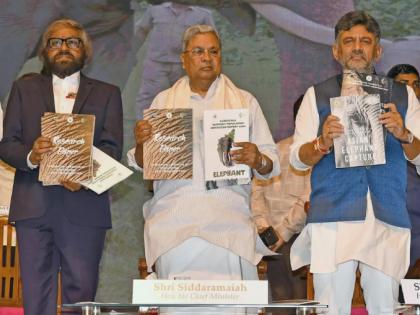Nine Task Forces Formed To Prevent Human Elephant Conflict In Karnataka
By Anubha Jain | Updated: August 13, 2024 11:10 IST2024-08-13T11:09:24+5:302024-08-13T11:10:11+5:30
Chief Minister Siddaramaiah said that the state government is paying more attention to prevent human-elephant conflict and 9 elephant ...

Nine Task Forces Formed To Prevent Human Elephant Conflict In Karnataka
Chief Minister Siddaramaiah said that the state government is paying more attention to prevent human-elephant conflict and 9 elephant task forces have been formed in the state. Siddaramaiah said Karnataka has the highest elephant population with 6,395 elephants, which makes up approximately 25%of the nation's total elephant population. While inaugurating the International Conference on Human-Elephant Conflict Management, which was celebrated on World Elephant Day by the Department of Forest Biology and Environment at the Center for Agricultural Sciences in Bengaluru, he said that every task force has a Deputy Conservator of Forest and formed under the leadership of the government. These task forces have prevented more than 1200 conflict incidents and sent elephants safely to their habitats in the last one year.
Established by the state government, these elephant task forces respond quickly to the problems of the public and farmers and work to protect people from elephant encounters. said that. Most financial technological innovations have led to community engagement efforts. He said that our government is also committed to empowering farmers by providing resources and subsidies to build solar fences. Aid efforts have protected more than 50 thousand hectares of agricultural land. It has helped protect livelihoods and promote coexistence of humans and wildlife, he said. Targeted forest under Karnataka Forest Harmonization Scheme. Aims to establish zero human-animal conflict values in the regions. The comprehensive plan includes water security, habitat improvement and active community participation strategies, he said.
Over 2500 incidents of conflict have taken place in the state in the last ten years. There were over 350 human deaths. There is also considerable crop loss. We have formed a task force to prevent all these. We have also focused on protecting elephant populations and habitats, he said. People have co-existed with elephants in the state for thousands of years. But recently, urbanization, highways, mining and industrial developments have expanded the range of humans. Thus, fences using railway tracks are used to prevent human-elephant conflicts. The tribal peoples under the forests have contributed a lot in the conservation of wildlife and forest despite actual conflicts. The Chief Minister said that they are true conservationists of wildlife who have protected forests and animals with forest tolerance. Through this conference, humans should take all necessary steps for a harmonious co-existence between elephants.
The Chief Minister said that these steps should be taken as a platform to explore innovative scientific solutions. The conference was attended by Forest and Environment Minister Eshwar Khandre, Chief Minister's Legal Adviser Ponnana, Deputy Chief Minister D K Shivakumar, Manjunath Prasad V, additional chief secretary, department of Forest, Ecology and Environment, Government of Karnataka, Brijesh Kumar Dikshit, Principal Chief Conservator of Forest and Subhash K Malkhede, Principal Chief Conservator of Forests (Wildlife) and Chief Wildlife Warden, Karnataka Forest Department. Forest Ministers of Kerala, Tamil Nadu, Telangana and Jharkhand and representatives of various states participated. The two-day conference on human-elephant conflict management, which aims to tackle the increased human-elephant conflicts, was organised by the Karnataka Forest department. The conference will see forest department officials from across India sharing knowledge with academic researchers and civil society organisations to bring about evidence-based inclusive approaches to human-elephant conflict solutions.